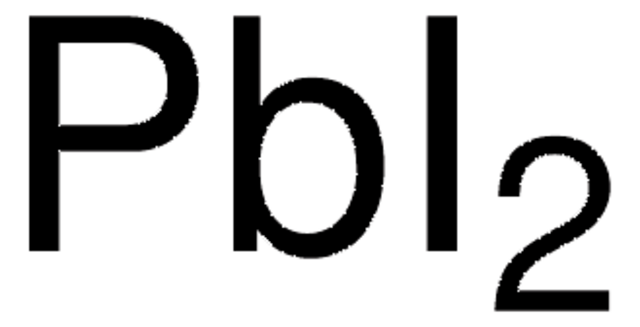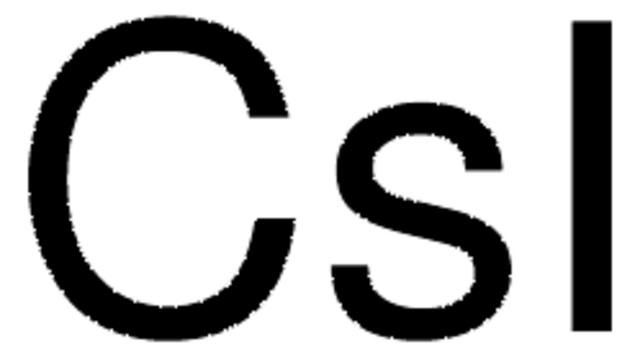About This Item
おすすめの製品
品質水準
アッセイ
99.999% trace metals basis
フォーム
solid
反応適合性
reagent type: catalyst
core: lead
不純物
≤15.0 ppm Trace Metal Analysis
bp
954 °C (lit.)
mp
402 °C (lit.)
密度
6.16 g/mL at 25 °C (lit.)
SMILES記法
I[PbH2]I
InChI
1S/2HI.Pb/h2*1H;/q;;+2/p-2
InChI Key
RQQRAHKHDFPBMC-UHFFFAOYSA-L
類似した製品をお探しですか? 訪問 製品比較ガイド
詳細
アプリケーション
- A precursor salt in the fabrication of perovskite solar cells. The addition of a small molar excess of PbI2 to the precursor solution can enhance device performance by improving charge extraction.
- A potential electrode material in battery configurations due to its electrochemical properties. Its ability to undergo reversible reactions makes it a candidate for use in lead-based batteries.
- A key component in combination with lead monoxide (PbO) to create a stable and sensitive semiconductor detector material for non-destructive testing (NDT) radiation dose detection.
- A key component to develop X-ray detectors for medical imaging.
- To prepare cesium lead iodide perovskite quantum dots for highly stable LEDs.
シグナルワード
Danger
危険有害性情報
危険有害性の分類
Acute Tox. 4 Inhalation - Acute Tox. 4 Oral - Aquatic Acute 1 - Aquatic Chronic 1 - Repr. 1A - STOT RE 2
保管分類コード
6.1C - Combustible acute toxic Cat.3 / toxic compounds or compounds which causing chronic effects
WGK
WGK 3
引火点(°F)
Not applicable
引火点(℃)
Not applicable
個人用保護具 (PPE)
Eyeshields, Gloves, type P3 (EN 143) respirator cartridges
適用法令
試験研究用途を考慮した関連法令を主に挙げております。化学物質以外については、一部の情報のみ提供しています。 製品を安全かつ合法的に使用することは、使用者の義務です。最新情報により修正される場合があります。WEBの反映には時間を要することがあるため、適宜SDSをご参照ください。
毒物及び劇物取締法
劇物
PRTR
特定第一種指定化学物質
労働安全衛生法名称等を表示すべき危険物及び有害物
名称等を表示すべき危険物及び有害物
労働安全衛生法名称等を通知すべき危険物及び有害物
名称等を通知すべき危険物及び有害物
Jan Code
203602-10G:4548173114101
203602-BULK:
203602-VAR:
203602-250G:
203602-50G:4548173114118
最新バージョンのいずれかを選択してください:
試験成績書(COA)
この製品を見ている人はこちらもチェック
資料
注目の新技術「ペロブスカイト太陽電池」を簡単に作製できる実験手順をご紹介します。
今日注目されているペロブスカイト太陽電池に繋がる、色素増感太陽電池(DSSC)にペロブスカイト化合物を用いた初期の事例を、韓国のNam-Gyu Park教授に紹介していただきました。
Dye-sensitized solar cells as a promising, low-cost photovoltaic technology.
Colloidal quantum dots (CQDs) are semiconducting crystals of only a few nanometers (ca. 2–12 nm) coated with ligand/surfactant molecules to help prevent agglomeration.
ライフサイエンス、有機合成、材料科学、クロマトグラフィー、分析など、あらゆる分野の研究に経験のあるメンバーがおります。.
製品に関するお問い合わせはこちら(テクニカルサービス)












